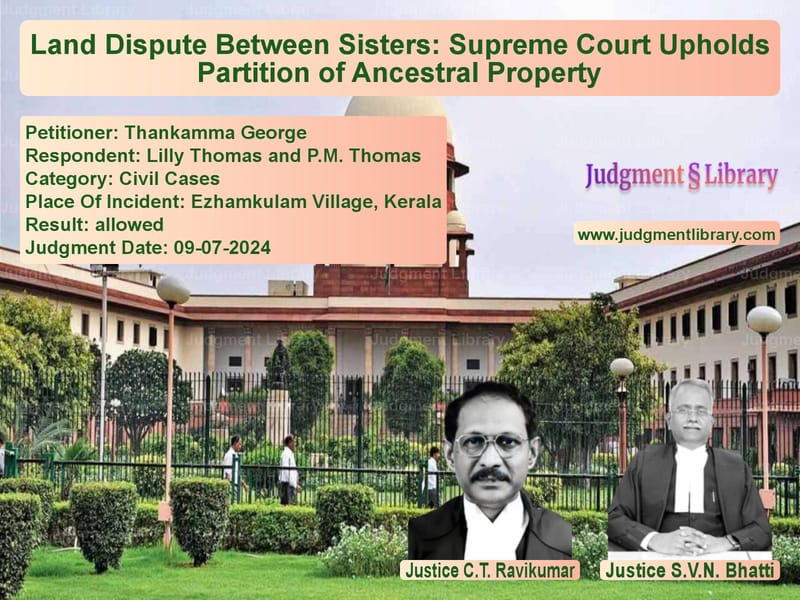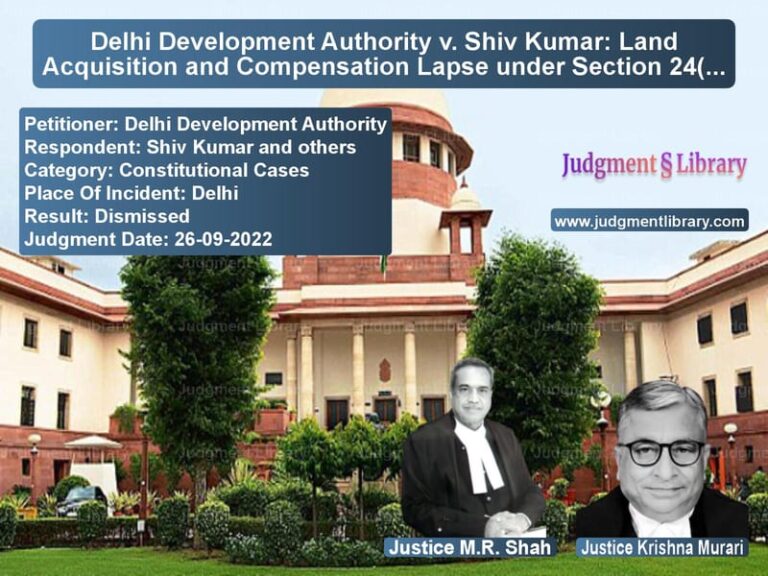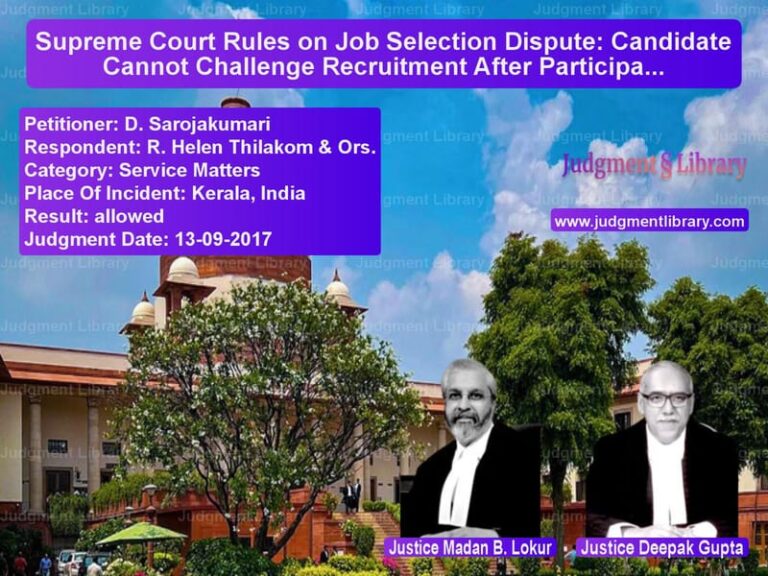Land Dispute Between Sisters: Supreme Court Upholds Partition of Ancestral Property
The Supreme Court of India recently ruled on a long-standing property dispute between two sisters, Thankamma George and Lilly Thomas. The case revolved around ownership rights over a jointly purchased property, the misuse of a power of attorney, and the subsequent sale of the disputed land. The Court upheld the partition of the property, reinforcing the principle that an agent cannot act beyond the authority granted by the principal.
Background of the Case
The dispute arose between the appellant, Thankamma George, and the first respondent, Lilly Thomas, who are sisters. The second respondent, P.M. Thomas, is the husband of Lilly Thomas. The conflict centered on a piece of land measuring 8.47 ares (approximately 1013 square yards) in Ezhamkulam Village, Kerala.
In 1991, the sisters jointly purchased 11.50 ares of land through a sale deed. However, in 2003, Thankamma, who was working abroad as a nurse, executed a power of attorney in favor of Lilly, granting her the right to manage and sell the property if necessary. In 2008, a portion of the land was sold with the appellant’s consent. However, Lilly unilaterally executed another sale deed, transferring the remaining portion of the property to her husband without Thankamma’s knowledge or consent.
Upon learning of the transaction in 2009, Thankamma sought legal recourse. She approached the Taluk Legal Services Authority but did not receive any relief. Consequently, she filed a civil suit in 2011, seeking a declaration that the sale deed executed in favor of the second respondent was void and that she was the rightful owner of half of the suit property.
Arguments Presented by the Appellant
Thankamma George argued that:
- The power of attorney she had granted to her sister was implicitly revoked when she personally participated in an earlier sale transaction in 2008.
- The sale of the disputed portion of the property to the second respondent was executed without her knowledge or consent and was therefore void.
- The sale consideration mentioned in the transaction was not paid, making the sale invalid under property law.
- She had filed the suit within the permissible limitation period, as she only became aware of the sale in 2009.
Arguments Presented by the Respondents
On the other hand, Lilly Thomas and her husband contended that:
- The sale was conducted within the authority granted under the power of attorney.
- The appellant was aware of the sale at the time of its execution.
- The claim was barred by limitation as the sale deed had been executed in 2008, but the suit was filed only in 2011.
- The appellant had received part of the sale proceeds from a prior transaction and could not selectively challenge one portion of the sale.
Findings of the Trial Court
The Trial Court ruled in favor of Thankamma George, holding that:
- The power of attorney had been implicitly revoked when the appellant jointly participated in the execution of an earlier sale transaction in 2008.
- The sale executed in favor of the second respondent was illegal and void.
- The appellant was entitled to a 50% share in the suit property.
- The respondents were restrained from further alienating or encumbering the disputed property.
High Court’s Decision
The High Court overturned the Trial Court’s decision, ruling in favor of the respondents. It reasoned that:
- The power of attorney had not been explicitly revoked.
- The appellant’s suit was barred by limitation as she had constructive notice of the sale deed.
- The sale transaction was legally valid despite the absence of monetary consideration.
Supreme Court’s Judgment
The Supreme Court scrutinized the facts and evidence presented and reinstated the Trial Court’s decision. The key observations made by the Court were:
- Implied Revocation of Power of Attorney: The Court held that the execution of a prior sale deed with the participation of the appellant constituted an implied revocation of the power of attorney granted to Lilly Thomas. Therefore, the subsequent sale to the second respondent was unauthorized and void.
- Legal Validity of the Sale: The Court emphasized that a sale transaction requires valid consideration. Since no sale consideration was exchanged, the transaction was null and void.
- Limitation Period: The Court rejected the respondents’ claim that the suit was barred by limitation, ruling that the limitation period started only when the appellant became aware of the sale.
Accordingly, the Supreme Court set aside the High Court’s ruling and restored the Trial Court’s decree. The Court further directed the respondents to either partition the property or compensate the appellant for her share.
Key Takeaways from the Judgment
This ruling underscores several crucial legal principles:
- An agent cannot act beyond the authority granted by the principal.
- Implied revocation of a power of attorney can occur through the conduct of the principal.
- A sale transaction without valid consideration is legally void.
- The limitation period in property disputes is determined by the date of knowledge rather than the date of execution.
Conclusion
The Supreme Court’s decision in this case highlights the importance of strict adherence to property law and agency principles. The ruling serves as a significant precedent for individuals who grant powers of attorney and later seek to challenge unauthorized transactions. It also reaffirms the legal protection of property rights against fraudulent alienation and misuse of authority.
Petitioner Name: Thankamma George.Respondent Name: Lilly Thomas and P.M. Thomas.Judgment By: Justice C.T. Ravikumar, Justice S.V.N. Bhatti.Place Of Incident: Ezhamkulam Village, Kerala.Judgment Date: 09-07-2024.
Don’t miss out on the full details! Download the complete judgment in PDF format below and gain valuable insights instantly!
Download Judgment: thankamma-george-vs-lilly-thomas-and-p.m-supreme-court-of-india-judgment-dated-09-07-2024.pdf
Directly Download Judgment: Directly download this Judgment
See all petitions in Property Disputes
See all petitions in Contract Disputes
See all petitions in Succession and Wills
See all petitions in Judgment by C.T. Ravikumar
See all petitions in Judgment by S.V.N. Bhatti
See all petitions in allowed
See all petitions in supreme court of India judgments July 2024
See all petitions in 2024 judgments
See all posts in Civil Cases Category
See all allowed petitions in Civil Cases Category
See all Dismissed petitions in Civil Cases Category
See all partially allowed petitions in Civil Cases Category







